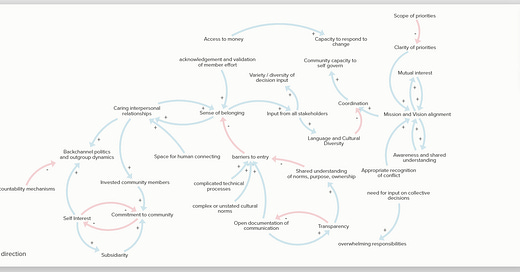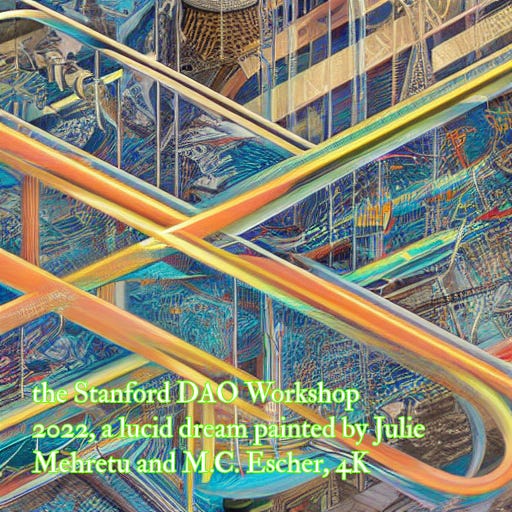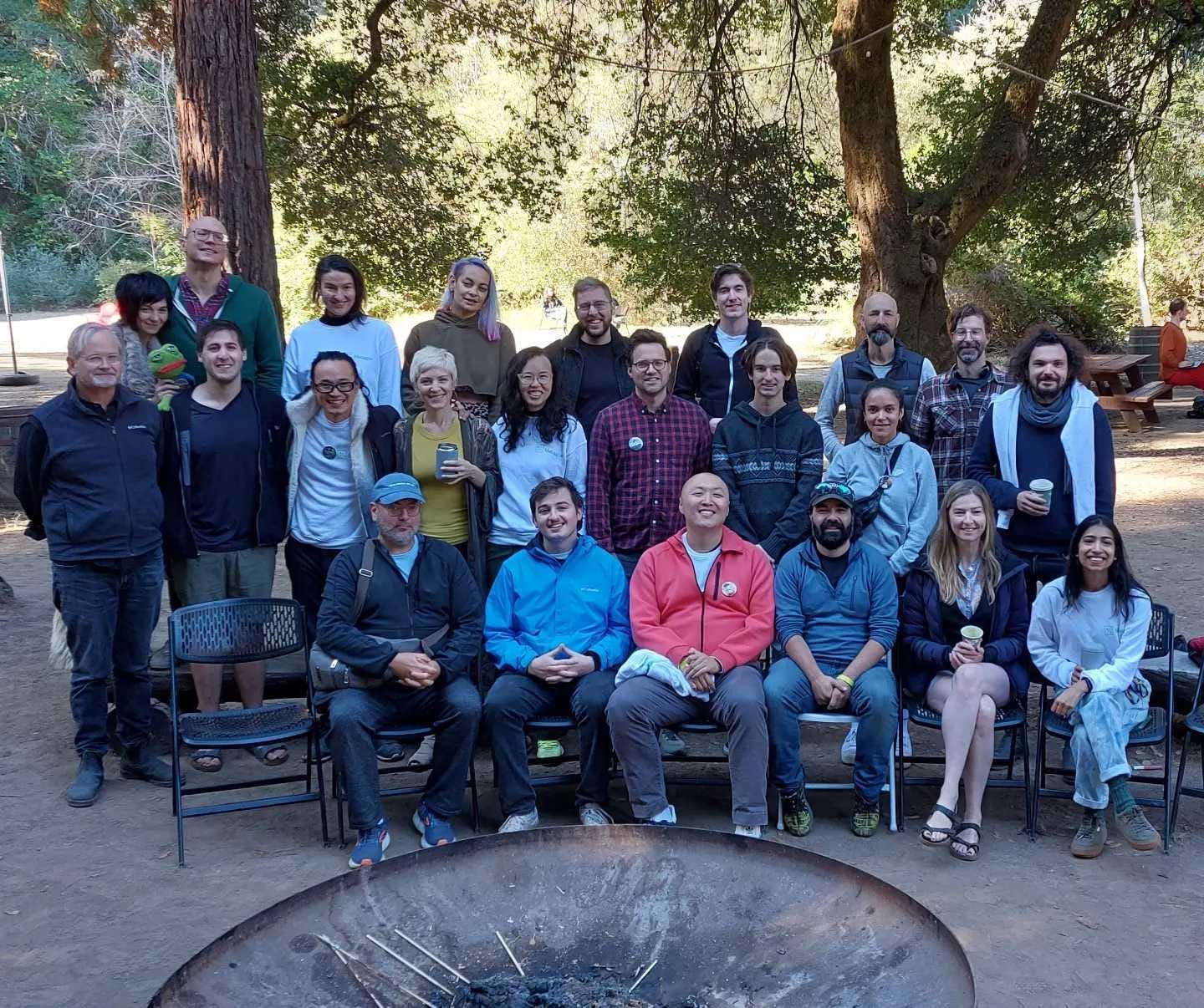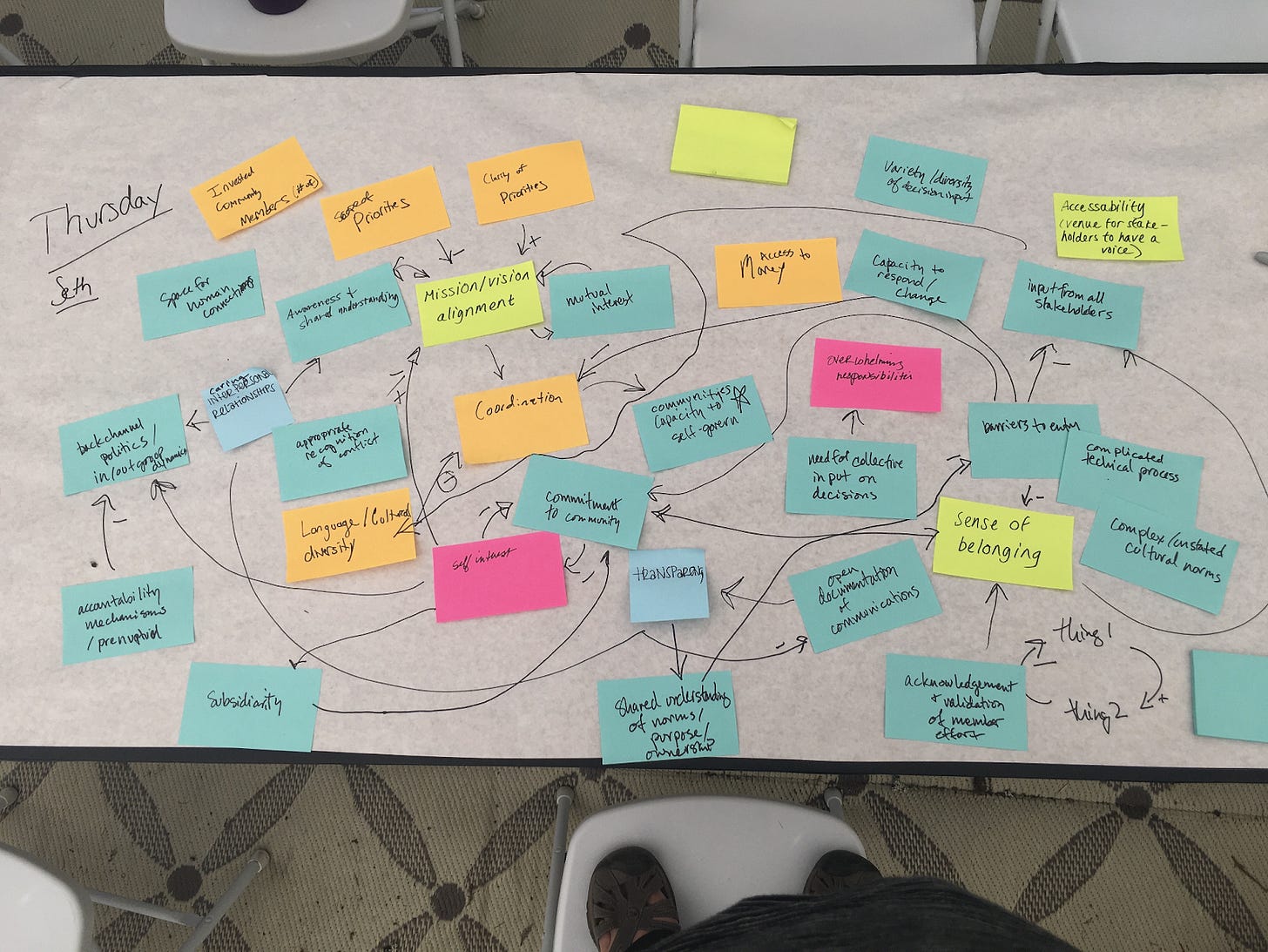Hi Metagovernors, welcome to the seventh edition of our newsletter! We’re happy to announce that we have a new section for the next few newsletters called The DWeb Long Echo: Ongoing Reflections and Sharings from Redwood Parliament.
Project News
New
Govbase Labs. Govbase has expanded its scope to include a regular, all-Metagov lab meeting. The lab meetings are currently led by Metagov research directors Joshua Tan, Ellie Rennie, and Michael Zargham. The meetings cover all active Metagov projects, but especially those that involve the production of any qualitative or quantitative data sets. To learn more and attend a lab meeting, join our community and introduce yourself in the #govbase channel.
DAOchem: DAOchem is a mixture of on- and off-chain governance data sources which react to produce a holistic view of DAO governance produced by Lucia Korpas with an ETH Denver hackathon team (Sage Shelton, Son Nguyen, and stryker). We are working to integrate data on smart contract parameters, voting activity, Twitter activity, and contributor sentiment to help DAO creators, contributors and researchers understand the governance landscape.
Digital Ethnography in Blockchain and Governance: Metagov has partnered with Tara Merk at BlockchainGov and Kelsie Nabben at RMIT’s University Blockchain Innovation Hub to pilot a three-month study group on digital ethnography in blockchain and governance. Our first two guests were Wassim Alsindi and Quinn DuPont. We read Wassim’s (Mis)adventures in Crypto-Governance, and Quinn’s Experiments in Algorithmic Governance. The sessions are being recorded and produced as part of Kelsie’s podcast, Mint & Burn. Listen to our episode with Wassim and Quinn. The third and final session of the pilot will feature Ellie Rennie on the topic of speculative ethnography. If you’d like to participate, join the community and introduce yourself in the #metaeth channel
Updates
Metagov Gateway. We brought on Or Zubalsky as a senior research engineer to lead the upcoming Metagov + Open Collective collaboration, where we’re building a no-code interface for expense voting on Open Collective (see mockups below) based on the original pilots by Shauna Gordon-McKeon, Miriam Ashton, and Amy Zhang.
We’re supported in this project by Hugi Asgeirsson and Memo Esparza of Open Collective, who recently joined us to talk about the UX flow and the additional reporting requirements of fiscal sponsors on Open Collective. In the meantime, Val Elefante is just starting a new survey project to help us better understand the needs of the open-source communities on Open Collective!
Governance Archaeology. Governance Archaeology is a dataset of historical collective governance institutions. It covers the whole world from the 5th millennium BCE to contemporary times. With a focus on premodern, non-western communities, governance archaeology seeks to expand the range of rules and practices that communities can use to govern themselves effectively, online and offline. It also seeks to challenge existing social scientific theories that limit the scope and range of collective governance institutions to a handful of modern examples. The project is led by Federica Carugati, with research assistance from Aashka Tank.
Validator Commons. The Validator Commons, a cryptopolitical party of validators and allies, recently organized a public town hall on the ATOM 2.0 proposal. Next week, we will be working with Antoine Vergne of Missions Publiques on a deliberative jury pilot, featuring randomly-selected jurors, expert witnesses, and a professionally-moderated discussion round inspired by Antoine’s work with offline communities. The Commons are also in the middle of posting a co-funding round to a number of proof-of-stake chains to fund the next year of our operations—see our recent post on Juno.
DAOstar. Lots of news here. DAOstar recently received a 120k euro grant from the European Union’s Next Generation Internet initiative to develop an integration between DAOstar and the NGI ONTOCHAIN project. We also recently hired two new people: Hazel Devjani of SCRF and Duke University as a research assistant to support outreach to DAOs, and Tucker McLachlan (creator of crowdwrite.xyz!) as a research engineer to support front-end development. Jenny Fan and Tucker, with support from research fellow Isaac Patka, are planning some big changes to the DAOstar website that will make it much, much easier for DAOs to adopt the EIP-4824 standard. Also, check https://daostar.one next week for a release of a new standard on proposal types from DAOstar’s Imperial Council working group. There’s also plans brewing for standards related to (Compound/OpenZeppelin) Governor, configuration audits (see Isaac’s awesome talk at Devcon!), and a SAFE contract for DAOs.
We’ve started to see some additional DAO frameworks implementing the EIP 4824, including DAO DAO and SuperDAO. Josh joined SuperDAO for their Twitter space to discuss the EIP and their integration.
DAOstar One continues to host a monthly roundtable featuring leaders across the DAO ecosystem and moderated by David Ehrlichmann of Converge and groundw3rk. Learn more and sign up for the community meetings.
Modpol: Modpol has a new website with documentation and a downloadable mod for Minetest. There is also a demo server available where you can try Modpol for Minetest in a multiplayer environment. To conserve resources, it is only online by appointment.
Open Problems in DAO Science. After the Stanford DAO Workshop, we hosted a successful Open Problems in DAO Science workshop (with over 140 attendees!) at Devcon Bogota that explored the research priorities of the larger DAO community. See graph below. The meta-editors (Tara Merk, Sarah Hubbard, and Joshua Tan) are recruiting additional section editors and are targeting a release at a future event in the spring—probably DAO Harvard (note that this event is still in stealth mode, so you won’t find anything about it on the internet 🤫).

Metagovernance Seminar
Upcoming:
James Martel joins us to discuss his book Anarchist Prophets: Disappointing Vision and the Power of Collective Sight, and consider the internet as a potentially anarchist space.
Recent:
Christina Pan joined us to discuss the findings of her research on the perceived legitimacy of content moderation processes.
Anna Weichselbraun led a Metagov Reads session on Loraine Daston’s Rules: A Short History of What We Live By.
Nick Merrill on the politics of “trustware”.
A Governance Workshop with Chris Wray where we collectively wrote a piece of theater on governance with Legra. See also Val Elefante’s reflection essay “Notes from ‘Allegro Legra’: Metagov’s Practical Governance Workshop #3”.
Bartholomew Rhodes on an energy coordination commons protocol and Nick Naraghi on bringing roles to DAOs as part of the community Short Talk series.
As always, a full archive of our seminars can be found on our Internet Archive page. Visit our Research Seminars page for the full schedule.
Research Network News
New Community Projects
Cartographies of Internet Metagovernance. Christina Bowen is a knowledge ecologist who we collaborated with at DWeb camp. She supported a couple of DWeb sessions with system mapping exercises (see The DWeb Long Echo below), and is continuing to map work coming out of Metagov, with a focus on research articles. The first piece she is mapping is Nathan Schneider and Amy Hasinoff’s “From Scalability to Subsidiarity in Addressing Online Harm”. If you’re an aspiring systems mapper, join our community and ask about the mapping sessions.

What Would We Ask? What Will We Ask is a new community event that we are trialing where we gather to co-create a list of questions around a particular topic or scenario in governance. We then break-out into groups to ask each other these questions and get to learn more about each other. Sessions will take place first Thursday of the month at 12-1pm ET, and are open to community members. Join our community to learn more, co-create, and meet others.
Unfinished Life Wrap-up
Making It Real: Building Value-Centric Technology (ft. Divya Siddarth)
The disasters of the “Web 2.0” era—surveillance capitalism, Cambridge Analytica, and all the rest—demonstrate that ethical values must be foundational to the development of new technology. But deciding on those values, let alone integrating them, isn’t as easy as it sounds. An ethicist, technologist, and political economist explore use cases that demonstrate how systems can be built to deliver principled outcomes.
Read, Write, Own: Towards the Future Internet, Opportunities & Challenges of a Decentralized Web (ft. Divya Siddarth & Primavera De Filippi)
How could web3, a decentralized internet based on blockchain technology and where users control their own data, positively address today’s problems with new governance structures? What are some of the opportunities and challenges presented by decentralized network governance? What relevance does the so-called “metaverse” have within this paradigm?
Are DAOs the Future of Collaboration? (ft. Joshua Tan)
Decentralized Autonomous Organizations (DAOs) are organizations that codify their values on the blockchain through smart contracts. They may help us reimagine our approach to collaboration of any kind — from corporations to journalism to fundraising to political campaigns. In this session, we’ll experience DAOs with the arts collective Blockchain Fairy Tales and then explore the opportunity and challenges in these new community structures with three leading DAO mavens and mayors.
Social Good & the Decentralized Web: Power, Equity, & Rights (ft. Nathan Schneider)
With each evolution of the web, technologists and futurists make promises of large-scale social benefits. These promises largely go unfulfilled and instead there is growing erosion of rights, opportunity, and equality. Web3 might present an opportunity to learn from past failures and build a better model. In this roundtable, we'll hear from a group of practitioners who have been building platforms and frameworks aimed at building a new paradigm of justice for Web3-- creating a future that is equitable, joyful, and generative.
Live Podcast Recording // GreenPill (ft. Nathan Schneider)
GreenPill is about crypto-economic systems that create positive externalities for their neighbors and for the world. Learn about the web3 builders who are solving coordination failures and creating a more regenerative infrastructure for the world using Ethereum. Hosted by Kevin Owocki.
Other Videos
Ostrom Workshops. Nathan Schneider and Seth Frey were at Indiana University’s Ostrom Workshop series, which focuses on the study of commons and commons governance. Nathan was in conversation with Doc Searls on the governance space of blockchains, and Seth gave a presentation on “Scaling comparative institutional analysis with computational approaches to knowledge commons”.
Exploring Inattention and Optimism in DAOs. At Devcon, Isaac Patka covered common misconfigurations of tools used by DAOs and the way that DAOs can be exploited by making assumptions about attention spans that are not congruent with reality.
Writing
Notes from ‘Allegro Legra’: Metagov’s Practical Governance Workshop #3. Metagov research assistant Val Elefante has written a thoughtful reflection on Metagov’s experiment with Legra, a multiplayer p2p todo list, developed by Chris Wray and Rob Knight, that instills a distinctive structure for groups that flips traditional, hierarchical project management on its head. Val relates the experience of working with the software to concepts of do-ocracy and consent-based negotiation.
Preliminary Report on CommunityRule from Two Members of Sociocracy for All. Alex Rodríguez and Ted Rau, who are both members of Sociocracy for All, have been looking into using CommunityRule as a tool for documenting how the framework of sociocracy could be used in the context of an organization that has deep shared understanding about its own governance. Here are some of the initial findings, written by Ted after some investigation into the structure of CommunityRule. Alex and Ted are also participants of the Metagov community and will be presenting on some of these findings during a seminar in December.
What connects crypto and ‘Love is Blind’? Charley Johnson writes about how speculation is shaping crypto culture, reality television, and all of us.
From Scalability to Subsidiarity in Addressing Online Harm. Amy Hasinoff and Nathan Schnieder write on the ways that restorative/transformative justice can inform our understanding of scale and subsidiarity on social media platforms.
Art with Constitution-in-the-Loop. Daniel Ari Friedman recently wrote a blog with art generated by Stable Diffusion, and prompted by the Amendments of the US Constitution. It also includes reference to Metagov and the "Constitutions of Web3" project.
To What Degree Can We Design Society? Toby Weed writes an article on what systems are likely to produce the best answers to the question of “what systems, if implemented, would improve society’s ability to solve problems when they arise?”
Crypto Wake. Crypto Wake is an archive of inactive, failed, and otherwise deceased crypto projects with lessons worth remembering. It is a collaborative wiki that welcomes contributions from those who remember or who are learning to do so. The project is the result of a quick conversation between Ellie Rennie and Nathan Schneider at Consensus 2022.
On Our Radar
QUERI: Decision-paralysis relief. QUERI is an archive of novel decision making tools that may provide users with temporary decision-paralysis relief. The collection—the largest of its kind in Rhode Island—began in 2014 and is maintained by Ben Sisto.
Citizens’ Assemblies Are Upgrading Democracy: Fair Algorithms Are Part of the Program. On algorithms and sortition in citizen assemblies.
Space Governance: Risks, Frameworks, and Futures. A new paper covering current frameworks for space governance, adaptive governance, scenario analysis, and policy proposals.
Foundation for Public Code’s Governance Game. A card game that helps organizations and communities explore governance around a shared codebase, whether hypothetical or in a real-world collaboration.
Facebook is experimenting with letting users help write speech rules. Aviv Ovadya gets a shout-out for his work on platform democracy in this article on a series of experiments that Meta has tried with user assemblies to deliberate and vote on preferred outcomes for climate information.
Towards Collective Safety: Transformative Methodologies. This paper pairs nicely with the piece by Nathan and Amy above. The piece draws from transformative justice frameworks and builds on community-based knowledge exchanges and mobilizing analytic tools from critical race and feminist inquiry to argue for approaches to online harm and abuse that do not continue to surveil, police, and incarcerate people.
Reflections on Time at Stanford DAO Workshop 2022. A twitter thread by @playerzer0x on the Stanford DAO Workshop, with images generated by Stable Diffusion.
This Danish Political Party Is Led by an AI. The Synthetic Party in Denmark is dedicated to following a platform churned out by an AI, and its public face is a chatbot named Leader Lars.
Opportunities
Postcapitalist Economic Systems Architect. One Project is looking for a Postcapitalist Economic System Designer to co-create new, and amplify, emerging economic and governance systems that are equitable, ecological, and effective.
Deadline: None listed
The Platform Governance Research Network Conference 2023. The Platform Governance Research Network brings together researchers interested in ‘platform governance’, broadly defined. From online labor markets and locally-tethered service delivery platforms, to social networks and cloud providers, we are interested in highlighting cutting-edge conceptual and empirical work that engages with the politics and policy of the 21st century ‘platformized’ internet.
Abstract Deadline: December 18
Wikimedia Research Grants. The Research Fund provides support to individuals, groups, and organizations with research interests on or about Wikimedia projects. We encourage submissions from across research disciplines including but not limited to humanities, social sciences, computer science, education, and law. We aim to support applicants who have limited access to research funding and are proposing work that has potential for direct, positive impact on their local communities.
Deadline: November 15
Metagov Open Positions. Metagov has open positions for a research engineer, marketing / community lead for DAOstar, and an intern. Look out for more open roles to be posted soon—including a COO position and a call for nominations for a DAOstar One executive director!
Deadline: Rolling until filled
The DWeb Long Echo: Periodic Reflections and Sharings from Redwood Parliament
The Redwood Parliament held during DWebCamp 2022 was collectively manifested over five days in late August, as a collection of workshops, an emergence of discussion threads, and an interweaving of interdisciplinary beings. Metagov, RadicalxChange, and collaborators gathered to share research and experiences around governance and to learn from the four hundred attendees of this “Retreat in the Redwoods”. Our aspirational goal for this emergence and interweaving: to create “Governance Layers for the Internet.”
Over the next few newsletters, we’ll be sharing some of the research and activities that were presented during camp, and the ongoing research and projects emerging out of our gathering.
Overview: Tony Lai, one of our co-curators of the Parliament, has written an overview blog and a poem synthesizing many of the interactions and projects that took place during camp.
Manifesto: Metagov has made a living manifesto on governance experience design, available to read and modify, with the help of Crowdwrite, a tool made by Tucker McLachlan for articulating collective intelligence in written form. The manifesto emerged out of our experiences at DWeb, which highlighted the importance of community and experience in the design of decision making.
Lightning Talk: Metagov researcher, Luke Miller, gave a lightning talk on BoxQuest, a decentralized interface for the physical world. The talk explores the question of autonomous systems in the real world using a decentralized network of users that track and interact with physical objects.
Mapping: Christina Bowen worked with participants of Engine Change at 80MPH: Transitioning Your Project from Benevolent Dictatorship to Community Ownership to map the dynamics of supporting or inhibiting a community’s ability to self-govern.

Work Group: Bobi Rakova and Megan Ma led a session on investigating power asymmetries in algorithmic systems through computable contracts. The session was very interactive and allowed them to distill the challenges and their proposed contract into a zine that could serve communities to imagine how their work on the terms-we-serve-with agreement could be implemented in practice. See elements of the zine in a new blog post about the project. Send an email to Bobi if you want to learn more, contribute, or get a copy of the zine.
Presentation: Nathan Schneider gave a talk on What Community Governance Should Feel Like where he invited participants to rethink their assumptions about how power should flow in online spaces, and how to design interfaces accordingly. He highlights CommunityRule and Modpol as experimental prototypes for online governance.
Panel Discussion: A panel discussion on decentralized public policy featuring Metagov community member, and Director of Emerging Technologies at the Aspen Institute, B Cavello.
- -
And that’s it for this edition of Metagov News. As always, if you’re not already subscribed to our newsletter, you can sign up below.
If you’d like to join the group of metagovernors discussing these topics, you can visit our community website and complete our survey.
🌱
Cent








